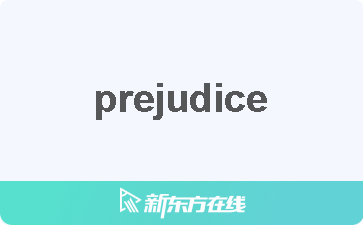prejudice
[NOUN, VERB]

prejudices
1. [C, U 有变体名词] 偏见
Prejudice is an unreasonable dislike of a particular group of people or things, or a preference for one group of people or things over another.
双语例句
例:There was a deep-rooted racial prejudice long before the two countries went to war.
早在两国交战之前就有了根深蒂固的种族偏见。
例:There is widespread prejudice against workers over 45.
人们普遍对年龄超过45岁的工人有偏见。
NOUN. 名词
prejudices , prejudicing , prejudiced
1. [T 及物动词] 使…有偏见
If you prejudice someone or something, you influence them so that they are unfair in some way.
双语例句
例:I think your upbringing has prejudiced you.
我认为你的家庭教养让你抱有偏见。
例:The report was held back for fear of prejudicing his trial.
因为担心会使他的审判有失公允,所以该报道没有被公开。
2. [T 及物动词] 损害
If someone prejudices another person's situation, they do something that makes it worse than it should be.
双语例句
例:Her study was not in any way intended to prejudice the future development of the college.
她的研究绝对无意损害该学院的未来发展。
VERB. 动词

关注新东方在线考雅课程中心
免费获取雅思备考资料包
雅思口语题库
扫码添加助教回复【口语题库】免费领取


 资料下载
资料下载
 公开课
公开课 编辑推荐
编辑推荐